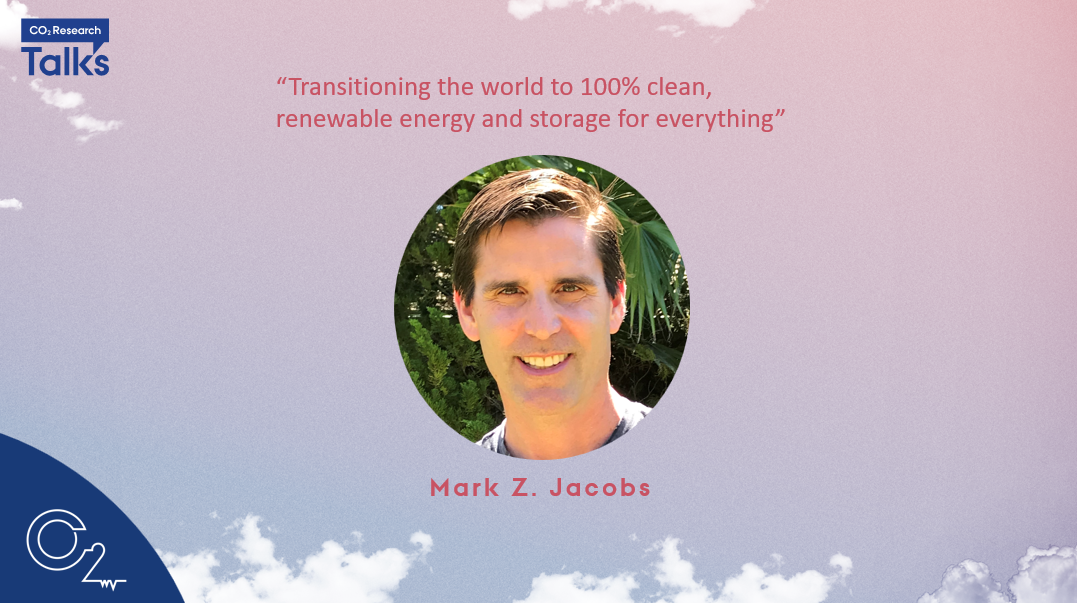CORC CO₂ Research Talks with Mark Z. Jacobson: Transitioning the world to 100% clean, renewable energy and storage for everything
On the 21st of February at 16.00 (CET), we have the honor of inviting dr. Mark Z. Jacobson from Stanford University. He is a Professor of Civil and Environmental Engineering and Senior Fellow at the Woods Institute for the Environment and at the Precourt Institute for Energy.

Info about event
Time
Location
Online
Organizer

About the talk
Global warming, air pollution, and energy insecurity are three of the most significant problems facing the world today. This talk discusses the development of technical and economic roadmaps to solve these problems. The solution is to electrify buildings, transportation, and industry and provide the electricity with 100% clean, renewable wind, water, and sunlight (WWS) and storage. This talk also discusses technologies available already to electrify buildings fully. It further discusses the electricity and heat generation technologies and the electricity, heat, cold, and hydrogen storage technologies needed for a transition. It then evaluates methods of keeping the electric grid stable. It also discusses technologies that are not needed or that might slow down a transition. Results indicate the grid can remain stable at low cost in each of 29 world regions encompassing 149 countries examined. Aside from mitigating global warming, these roadmaps have the potential to eliminate over seven million air pollution deaths annually, reduce international conflict over energy, stabilize energy prices, reduce catastrophic risk, and create jobs.
Bio on Mark Z. Jacobson
Mark Z. Jacobson is Director of the Atmosphere/Energy Program and Professor of Civil and Environmental Engineering at Stanford University. He is also a Senior Fellow of the Woods Institute for the Environment and of the Precourt Institute for Energy. He received a B.S. in Civil Engineering, an A.B. in Economics, and an M.S. in Environmental Engineering from Stanford in 1988. He received an M.S. and PhD in Atmospheric Sciences in 1991 and 1994, respectively, from UCLA and joined the faculty at Stanford in 1994. His career focuses on better understanding air pollution and global warming problems and developing large-scale clean, renewable energy solutions to them. He has published six books, including his latest, “No Miracles Needed,” and over180 peer-reviewed journal articles. He is ranked as the #1 most impactful scientist in the world in the field of Meteorology and Atmospheric Sciences and #6 in the field of Energy among those first publishing past 1985. He received the 2005 American Meteorological Society Henry G. Houghton Award and the 2013 American Geophysical Union Ascent Award for his work on black carbon climate impacts and the 2013 Global Green Policy Design Award for developing state and country energy plans. In 2015, he received a Cozzarelli Prize from the Proceedings of the National Academy of Sciences for his work on the grid integration of 100% wind, water and solar energy systems. In 2018, he received the Judi Friedman Lifetime Achievement Award “For a distinguished career dedicated to finding solutions to large-scale air pollution and climate problems.” In 2019 and 2022, he was selected as “one of the world’s 100 most influential people in climate policy” by Apolitical. In 2022, he received the Visionary Clean Tech Influencer of the Year award at the World Clean Tech Awards. In 2023, he was named one of the top 100 people globally “who have made an impact on the world this year” among “innovators across various industries, including art, entertainment, business, and philanthropy,” by Worth magazine. He has served on an advisory committee to the U.S. Secretary of Energy, appeared in a TED talk, appeared on the David Letterman Show to discuss converting the world to clean energy, and co-founded The Solutions Project nonprofit. His work is the scientific basis of the energy portion of the U.S. Green New Deal and laws to go to 100% renewable energy in cities, states, and countries worldwide.
